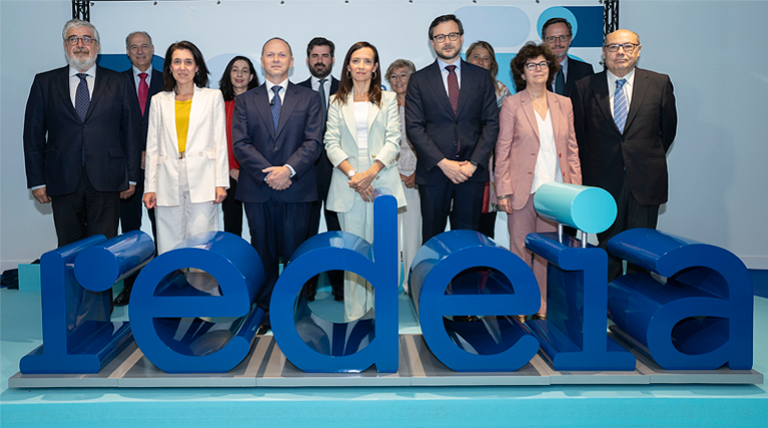We are a global operator of essential infrastructure
- Through a collaboration agreement with the Canary Islands Employment Service, around 600 unemployed people from the construction sector will be able to specialise in the specific skills required for the construction of the new hydroelectric power station, promoted by Red Eléctrica de España
The Regional Minister for Economy, Knowledge and Employment for the Canary Islands Government, Elena Máñez; the President of the Island Council of Gran Canaria, Antonio Morales; the President of the Construction Labour Foundation, María de la Salud Gil, and the regional delegate for Red Eléctrica de España (REE) in the Canary Islands, Ainara Irigoyen, this morning presented an innovative training proposal, aimed at the qualification of workers in the specialities that the construction of the 'Salto de Chira' power station project may require.
The Regional Minister for Employment, Elena Máñez, highlighted the added value that the collaboration of public entities with the productive system and its companies, who are the ones who have an in-depth knowledge of the skills they need in their employees, brings to active employment policies. In this regard, Ms. Máñez recalled that "the Canary Islands Employment Service has been working for some time on this type of modular and specialised training, which we already provide, for example, in ship repair companies and which allows our population to be trained in skills that are sometimes not offered by the more formalised and regulated education, but which are decisive in increasing the competitiveness of our companies”.
During his speech, Antonio Morales highlighted the opportunity to promote jobs related to green and sustainable development and, in this regard, he remarked that the Salto de Chira project "will make Gran Canaria a world reference with a unique energy project, which will allow us to advance in energy sovereignty, but also water, as the hydroelectric power station will make full use of the available supply of water, with the largest project that has been carried out on the island in recent years and that will create more than 3,000 jobs during its construction”.
The 40 specialised training courses planned will be given at the facilities of the Construction Labour Foundation, whose President, María de la Salud Gil, highlighted digitalisation skills as the great challenge facing the sector "and which can make the difference between our companies and those that may come from outside the archipelago". Ms. Gil defined the project presented today as "a prototype of what public-private collaboration should be" and underlined the fact that the pandemic crisis situation and the arrival of European funds to the islands should be seen as "an opportunity to accelerate the capacity for transformation in all those aspects that make us more competitive".
Furthermore, she stressed the great improvement in employability that these courses will mean for each of the participants "who will have the precise knowledge demanded by the civil construction sector and, therefore, will have many more possibilities of choosing where to work afterwards".
The delegate of Red Eléctrica de España in the Canary Islands, Ainara Irigoyen, thanked both the Employment Service of the Ministry of Economy, Knowledge and Employment of the Government of the Canary Islands and the Construction Labour Foundation for their vision regarding the promotion of vocational training, because such training will result in the professional qualification of a large number of workers on Gran Canaria and will definitely increase their competitive skills.
In her speech, Irigoyen emphasised "Red Eléctrica's commitment to create shared value in all the territories where it carries out its projects", before expressing her conviction that these courses "can increase the employability of workers in Gran Canaria, and therefore be able to participate in this project or in others that may require similar specialisation." The REE representative concluded by pointing out that "the Company will participate and collaborate with the Foundation by providing REE professionals for the delivery of the training, as they are specialists in the field and have extensive experience in many of the training modalities".
The Construction Labour Foundation and REE recognised the opportunity to increase the professional qualification of workers by providing them the necessary knowledge to be able to work on such a unique project, and what’s more REE even offered its professionals as teachers in this specialised training. Thus, in view of the high number of jobs expected, a training programme was designed with specific subjects to cover the qualification gaps detected and substantially improve the employability of dozens of people, both for this infrastructure and for other civil construction works that may be undertaken, thanks to the collaboration of the Canary Islands Employment Service in its endeavour to have a sufficiently prepared workforce on the Islands.
Some project details
Thanks to the close collaboration between all the parties involved, it will be possible to provide special training:
- For specialist professionals, on aspects such as BIM methodology, which is based on collaborative work applied to the construction sector, to facilitate project management.
- For site managers and foremen, in the control and monitoring of works and mathematical skills and abilities.
- And for machine operators responsible for handling the specific machinery required for this project, which will enable them to meet the exact needs of Red Eléctrica and for which the Company could not easily find suitable profiles in the Canary Islands labour market.
Additionally, this initiative will provide them with cross-cutting training in skills such as safety in confined spaces, risk prevention when working at heights and other aspects.
This project is aimed at those people for whom a small training boost can make the difference when it comes to finding a job, without forgetting the cross-cutting criteria that are applied to the Canary Islands Employment Service's selection processes.
Thus, the people to be trained must be unemployed and registered with the employment offices and, among those who meet the requirements for each speciality, priority will be given based on the following criteria, among other factors:
- Young people under 30 and those over 45 years of age.
- Long-term unemployed jobseekers.
- Women who are victims of gender violence.
- People with a recognised disability equal to or greater than 33%.
Lastly, an attempt will be made to increase the participation quota in favour of women to a percentage of around 55% with the aim of facilitating their presence in sectors in which they have traditionally been under-represented.
It is estimated that 4,366 jobs will be needed during the construction phase of the wind-hydro power station, of which 3,518 will be generated in Gran Canaria.














